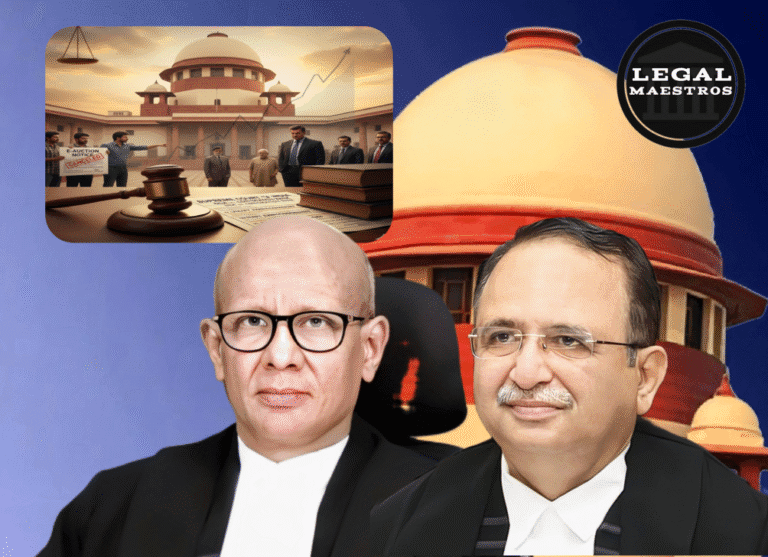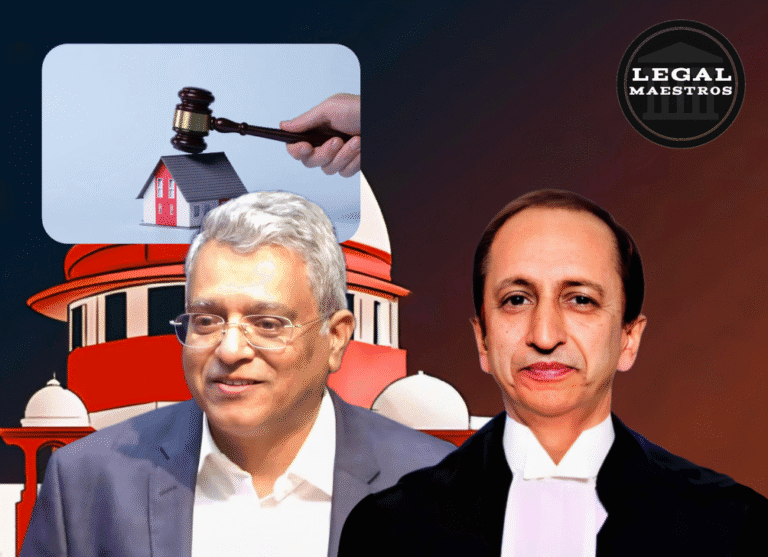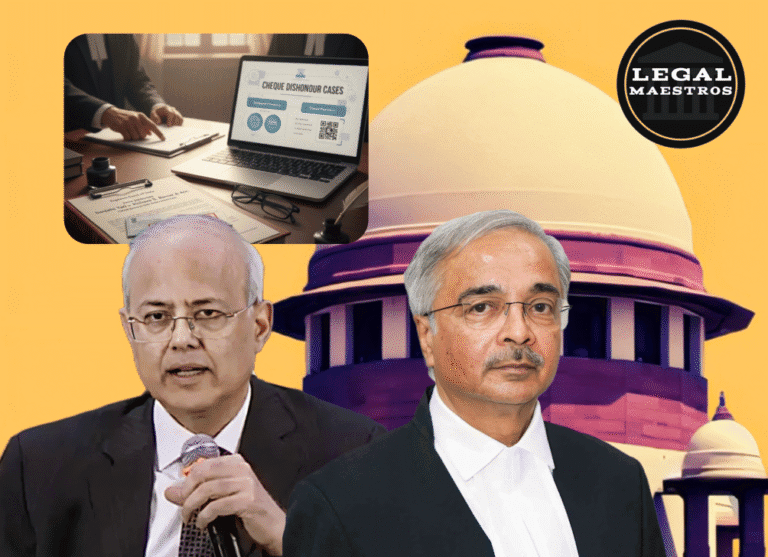
Severe admonition by high courts against judicial officers This is not the first time that the Supreme Court of India has brought an important issue of transfer of judicial officers due to strictures, by the high Courts of this country. Kaushal Singh v. The apex court in the State of Rajasthan had discussed whether equal observations could be used or not and this case has given some important guidelines to other superior courts. It is an important case that was ruled on July 18, 2025, that indicates the importance of balance and following the natural principles of justice when considering the behavior of lower courts.
Case Facts
The appellant is a Judicial Officer of the District Judge Cadre in the State of Rajasthan- Kaushal Singh going by his second name wanted to appeal to the Supreme Court to challenge strictures that were meted by a Single Judge of the High Court of Judicature of the Rajasthan Bench at Jaipur. The challenged order, issued on May 3, 2024, was as a result of a bail application that was determined by the High Court.
The case that the present judgment arises out of a First Information Report Number 224 of 2022 that was registered on October 23, 2022, in Ajmer, against a number of individuals, among whom are also the accused Sethu @ Angrej and Sethu @ Haddi, in relation to diverse offenses under the Indian penal code, in particular, under Section 307 of this code (attempt to murder). On November 21, 2022, Sethu @ Haddi was arrested, and on November 25, 2022, it happened with Sethu @ Angrej. On December 16, 2022, the High Court granted bail to Sethu @ Haddi by observing that the fatal injury was said to be caused by Sethu @ Angrej and, therefore, the case of Sethu @ Haddi did not belong to the same category.
Then, on December 17, 2022, the Judicial Magistrate rejected Sethu @ Angrej bail application. He subsequently sought bail under Section 439 of the Code of Criminal Procedure, 1973 and his application, together with two others (on the same FIR) was listed before the appellant-Judicial Officer on December 19, 2022. What was argued was that the circumstances surrounding the application of the applicants were repeated of other cases that had previously been granted bail by the High Court (in the case of Sethu @ Haddi).
After apparently falling into the trap of believing that life-threatening injuries were blamed in Sethu @ Haddi, it was all three of the accused, including Sethu @ Angrej, the appellant-Judicial Officer, granted bail to them on the basis of the principle of parity and the High Court order recorded in Khet Singh and Another v. Rajasthan state. More importantly, when the bail was granted by the appellant-Judicial Officer, no heed was paid to the criminal backgrounds of Sethu @ Angrej.
The person who registered the FIR had requested the cancellation of the bail of Sethu @ Angrej, which was, granted by Sessions Judge on July 6, 2023, who noted that the court had been misled. High court was then approached by Sethu @ Angrej. In the High Court, having denied his bail application, the Court, in its order dated May 3, 2024, used strictures against the appellant-Judicial Officer saying that the counsel had accepted the bail application in a grossly improper and cavalier manner without caring about the criminal records of the accused. The High Court also pointed to another fact that Sethu @ Angrej was the main accused that led to the fatal injury and that the appellant-Judicial Officer had failed to decide the order of High Court dated December 16, 2022, and the principles established in Jugal v. State of Rajasthan, wherein it was made mandatory to consider the Incorporation of Criminal records in form of table during the grant of bails. The High Court reaffirmed that the act of the Judicial Officer would constitute indiscipline, negligence and hence ignorance of the orders/judgment passed by the High Court too and the order was directed to be placed by a copy in the hands of the Chief Justice of the High Court of Rajasthan. Feeling aggrieved with these strictures the Judicial Officer approached Supreme Court with the appeal.
The analysis of the strictures against judicial officers by the Court
In its judgment, the Supreme Court has held afresh a rather well-established rule of law that High Courts are by and large not supposed to cast strictures on fellow judicial officers when deciding these cases on the judicial side. The Court appealed to its previously made decision in Re: K, A Judicial Officer, where the validity and legality of such strictures were fully discussed.
In the matter of High courts having administrative, judicial and disciplinary control over subordinate courts, the Supreme Court has pointed out that according to the constitutional scheme, High Courts have administrative, judicial and disciplinary control of subordinate Courts. The position of the High Court acts as a friend, philosopher and guide. Even though a higher court has a possibility of recording any observation, including a negative one, in a judicial order, the Supreme Court, has identified various “mischievously unfounded infirmities” on account of strictures of a subordinate judicial officer.
To begin with, the judicial officer is pronounced guilty without having a case which contravenes the rules of natural justice. The Court made this point that a judicial officer who is a giver of justice should not be deprived of this key right. Second, the damage to such criticism is infinite since it becomes public. In the same case, the same High Court Judge sitting on the administrative side may feel bad to note the comments that he made on the judicial side when he is informed about the meritorious conduct of overall performance of the officer. Thirdly, this kind of criticism may provide the litigating parties with a false feeling of success not only against the opponent but also against the deciding judge, which is subversive of the authority of the judge. Fourthly, by making a judicial officer add the request to expunge observations in form of an appeal, the latter are put at the level of a litigant, which is not a very happy state of affairs. And, finally, the stress in the fact that an otherwise honest and upright judge may on some occasion be trapped in the network of negative comments may be deeply discouraging to the officer and his associates.
Otherwise wise and desirable Action
The Supreme Court stressed that unbecoming conduct of a non-constitutional office holder, particularly, of a subordinate judicial officer is not to be ignored but there is a sure method more advisable. The High Court can rule out the case on its merits as opposed to reflecting the criticism in the pronouncements of the court. At the same time confidential office proceedings may also be commenced to report the conduct of the judicial officer to the Chief Justice. The procedure under this administrative pathway enables the Chief Justice, or an Inspecting Judge or the full court to address the case. The most important, it offers a chance to the subordinate judge to argue his/her point and explain the situation, so that he/she is not brought to judgment without hearing. Unfavorable administration decision would as well provide the officer with the remedies at disposal of the law.
Modification or Alteration of Precedent and of Strictures
The Supreme Court also observed that the order given by High Court in the case at hand apparently depended on the decision in Jugal v. State of Rajasthan which in its turn had been overturned by the Supreme Court in Ayub Khan v. The Rajasthan state on December the 17 th in the year 2024. This flip flop was a big dent in the basis of strictures issued against the appellant-Judicial Officer.
With these considerations, the Supreme Court was also decisively of the view that the strictures against the appellant-Judicial Officer by the High Court were not only “uncalled-for” but had to be expunged under the impugned order to that extent only.
The Significance of Disclosing Prior Criminal Histories in Applications of Bail
In addition to the isolation of the case of strictures, there is one more issue that the Supreme Court was working on: the taking into account criminal backgrounds of people who apply for bail. The Court has put emphasis on Rule 5 of Chapter 1-A(b) Volume-V of the Punjab and Haryana High Court Rules according to which the petitioners seeking bail must reveal as to whether the case mode similar application to the Supreme Court, the fate of the same and whether the petitioner is facing any criminal proceeding besides and its details.
The Supreme Court voiced its opinion that all the High Courts in the country may look into providing a healthy prospect like this in their own High Court Rules and / or Criminal Side Rules. This would place a definite compulsory condition of producing the required disclosures about the criminal background by the accused thus facilitating an enlightened decision regarding bail. This Court made an order that the Registrar Generals of all High Courts should be informed of a copy of the order, to consider whether a rule to that effect should be prescribed.




1 thought on “Supreme Court Bench of Justices Sandeep Mehta, Vikram Nath, and Sanjay Karol Says High Courts Must Show Restraint: Personal Remarks Against Judges Not Justified”